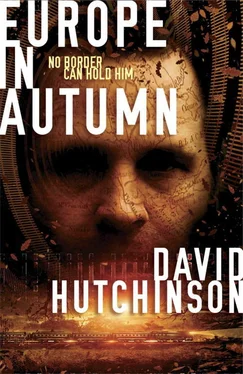Which may have been the point of the exercise all along.
IT WAS SAID that the more Line stations a nation had, the more important it was. This was nonsense, of course, but it irked Poles that, though the Line crossed their country from west to east, there was only one station. Most nations had two or three; some polities had two.
The Polish government affected not to notice what was obviously a calculated snub. Of course, when the Polish government affected not to notice something it was marked by no-confidence motions, and if that didn’t make any difference it led to mass resignations. And if that didn’t work the entire government would implode. The Prime Minister would attempt to resign, the Sejm would refuse to accept his resignation, things would limp along for a while, then the Communists – sorry, the Social Democrats – would win the subsequent elections. It had been going on for decades. Poles had long since stopped being surprised by the process, though it always elicited astonished articles in magazines like Time/Stone .
There was also a certain perceived snub in the fact that the Line’s only Polish consulate wasn’t even in the capital. Poznań took a lot of pride in having the consulate. The city had for centuries been the main bastion of Poland’s western border, and the Paris-Berlin-Moscow rail line already ran through the city. To Poznanians, it was only sensible that the Line should visit as well, and they enthusiastically assented to the demolition of a large amount of property to allow access for a branch line.
It had so infuriated the Government that there had even been talk of Poznań seceding from the Polish Republic and becoming a polity, but at some point wiser heads had intervened and decided it was preferable for the Line to have a Consulate in a Poznań that was still Polish, the better to suck out the inevitable financial benefits for the greater good, and there had been a good deal of civic feather-smoothing done in the city by ministers from the central Government. But it had been a close-run thing, and you could still buy T-shirts and fridge magnets with an Independent Republic Of Poznań logo – dreamed up by an advertising company in Luxembourg – on them. Just a little reminder to Central Government of the stakes that were involved.
“WHAT DO YOU see?” asked Fabio.
Rudi looked about him. “Trees,” he said. He pointed. “Oh, look, and a lake.”
Fabio glanced at him and raised an eyebrow. “What do you see?” he asked again.
Though it was impossible to tell just by looking at him, Rudi strongly suspected that Fabio was suffering from a hangover. He’d been so taken with the wine at last night’s meal that he had ordered another couple of bottles, and the last Rudi had seen him he was waddling towards the lift with one in each hand. He hadn’t shown up for breakfast this morning, and a discreet inquiry with the hotel’s receptionist elicited the information that the gentleman in Room 302 had left a tag on his door last night requesting a room service breakfast. Which he had barely touched.
Rudi was having lunch when Fabio finally surfaced, striding into the dining room, face glowing from a recent shave, hair combed, fresh shirt and suit and tie, shoes shined. He did not, however, sit down to eat. Instead he stood by the table and informed Rudi that they were going for a walk.
What they actually did was walk to the nearest stop and take a tram. They got off a dozen stops later, walked to a taxi rank, and hired a cab. The cab drove them a kilometre or so, then Fabio paid off the driver and they got out and caught a bus. By the time they got off the bus, at the gates to a park, Rudi was completely lost. They wandered around the park for about half an hour, and then Fabio started asking Rudi what he could see.
Rudi had pretty much had enough by now. “I was enjoying my lunch, by the way,” he said.
“What do you see?” Fabio asked for the third time.
Rudi sighed and looked around again. Trees, yes. Lake, yes. People out walking. He tipped his head to one side. On the other side of the little park, between the trees, he could see the matt-grey shine of closely-woven metal mesh.
“Fence,” he said.
Fabio snorted and set out towards the fence. “Come on.”
The fence was about ten metres high and defined the park’s boundary. In one direction it curved away out of sight; in the other it ran off, perfectly straight and apparently into infinity. Beyond it was an open space perhaps a hundred metres deep, and beyond that another fence. Looking through both sets of mesh, Rudi could only make out vague shapes, but above the second fence rose the stilt-legged forms of freight-handling machinery. A goods yard.
“The Line passes about ten kilometres south of Poznań,” Fabio said quietly as they walked along the fence. “There’s no way they could have brought it through the city. They’d have had to demolish the place. As it was, they had to knock down a lot of buildings for the branch. It forks off just after the Line crosses the Warta and it ends just up there –” nodding casually to where the fence curved away into the city. “What you have is two sets of tracks with a fence running up both sides. Outside that there’s a cleared strip that’s continually patrolled and surveilled. It’s sown with sensors and, if the stories are true, with anti-personnel devices. Outside that there’s another set of fences–” he gave the fence they were walking beside a slap with the flat of his palm. “Smartwire. Passive surveillance devices. The whole thing is a little over five hundred metres across.” He brushed his palms together as if to knock off any dirt from the fence, and struck off at an angle to it, Rudi trailing in his wake. “How would you get in?”
Rudi thought about it. An outer fence that would detect anyone trying to climb it or cut through it. Then a hundred-metre dash across what was basically a death-strip with no cover, only to reach yet another fence. “I wouldn’t,” he said. “Not unless I could turn the fence and the cameras off and I had a map of the countermeasures on the other side. And even then I wouldn’t.”
Fabio nodded his assent.
Rudi looked at him.
Fabio looked at where the fence curved away. “About a kilometre from here, the fences draw apart and then curve back together until they enclose a teardrop-shaped space two kilometres across at its widest point. That’s where the marshalling yards and the diplomatic compound are. That’s where the Line’s border crossing with Poland is.” He dipped a hand into a jacket pocket, withdrew it holding a little plastic card between his fingers. “And that’s why your passport has a work visa for the Line.”
Rudi took the card. It had his photograph on the front, but it had someone else’s name. “I don’t remember having this photograph taken,” he said.
“Mm,” said Fabio.
“Have you been photographing me without telling me?” he asked angrily.
“All you have to do is keep watch,” Fabio told him. “You can surely do that?”
Rudi looked at the card again. “I look like a halfwit.”
“It’s a good likeness, I agree,” Fabio murmured.
Rudi put the card into the breast pocket of his denim jacket. “So. When do we go in?” he said. And then he realised Fabio was carrying his heavy attaché case. He hadn’t been carrying it when they left the hotel, and he hadn’t been carrying it a few moments earlier when he slapped the fence. Rudi looked around, wondering which of the other people wandering around the park had delivered it to Fabio. He hadn’t seen the pass, hadn’t even been aware of anyone coming within five metres of them. It was all done like magic. “Oh, no,” he groaned.
“MY NAME IS Rausching,” said Fabio, swinging his attaché case happily as they approached the border. “You call me ‘Herr Rausching.’ You’re my personal assistant.”
Читать дальше







